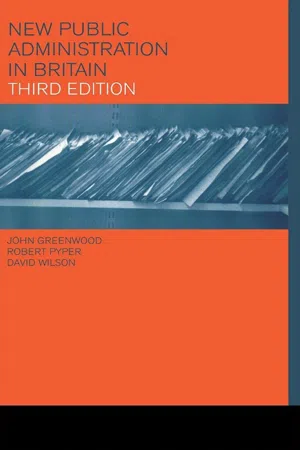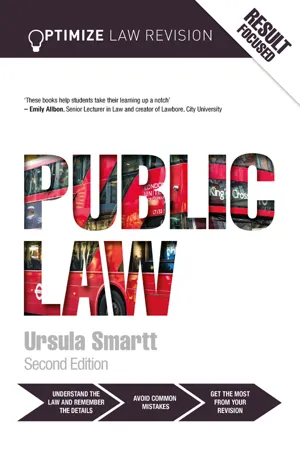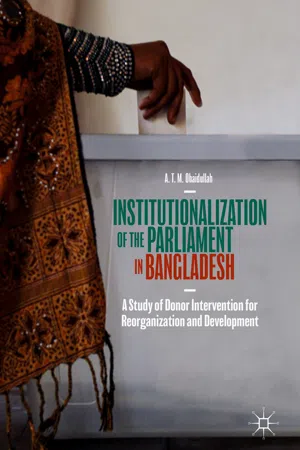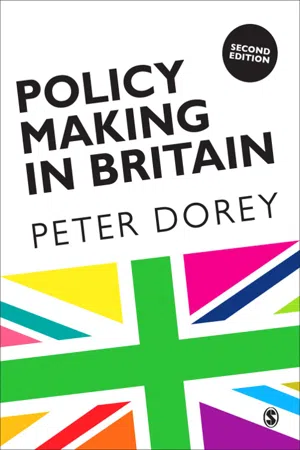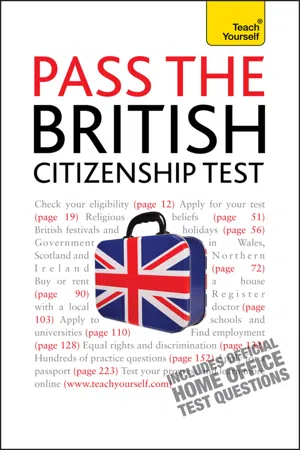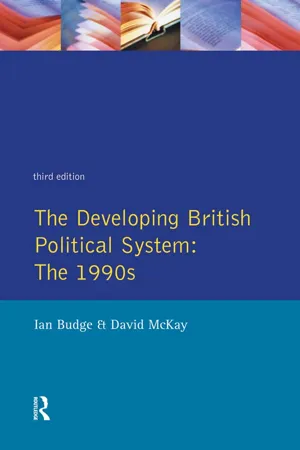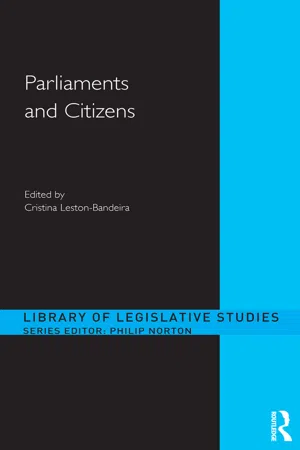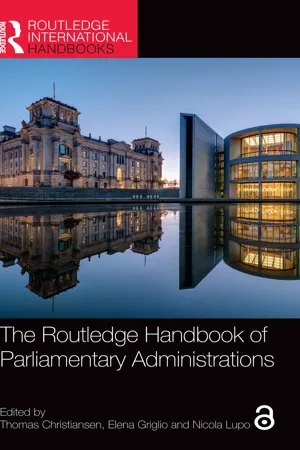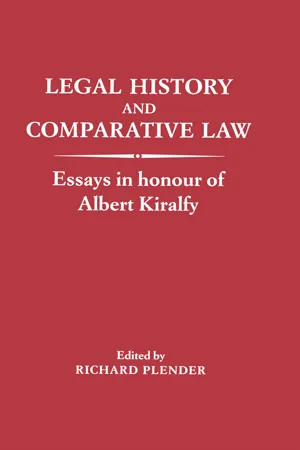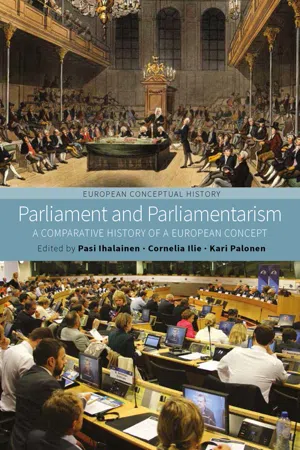Politics & International Relations
UK Parliament
The UK Parliament is the supreme legislative body in the United Kingdom, consisting of two houses: the House of Commons and the House of Lords. It is responsible for making and passing laws, scrutinizing the government, and representing the interests of the public. The Parliament plays a crucial role in the UK's political system and governance.
Written by Perlego with AI-assistance
Related key terms
10 Key excerpts on "UK Parliament"
- eBook - ePub
- John Greenwood, Robert Pyper, David Wilson(Authors)
- 2005(Publication Date)
- Routledge(Publisher)
It is clear why we should take Parliament seriously. The executive arm of the state emerges from, and is accountable to, Westminster. The elected representatives of the people gather there to help formulate policy, process legislation and scrutinise the workings of the government machine. Nonetheless, Parliament’s place in the system of government and public administration has undoubtedly been affected by shifts in power towards the European Union, devolved bodies within the UK, and a range of other national and sub-national bodies such as quangos. The Westminster Parliament continues to occupy a place of central importance in the UK polity, but, as the nature of the political system itself changes, so too does the body at its core.In this chapter we examine the roles and working practices of MPs, the key Westminster functions, and the issues of reform facing this central institution.Having encountered relatively little change in its basic role and functions for centuries, Parliament is now confronted with a series of challenges to its traditions and its place in the UK constitutional framework. Partly as a result of this, the House of Commons is being required to modernise its systems and procedures, while the composition and future role of the House of Lords are changing. The winds of change are blowing through Westminster, and as the entire edifice is adjusting to meet this series of new demands, it is attracting fresh interest from academics and politicians.Honourable Members
The work of British Members of Parliament can be categorised in different ways. A simple classification of MPs’ roles would encompass party political activities, constituency work, legislating, and scrutinising the executive. While performing these roles, MPs are considered to be performing as representatives rather than delegates. This distinction has some significance, at least in theory. - eBook - ePub
- Ursula Smartt(Author)
- 2016(Publication Date)
- Routledge(Publisher)
Royal Assent. The Crown informs Parliament of the Government’s policy ideas and plans for new legislation in a speech delivered from the throne in the House of Lords (known as the Queen’s or King’s Speech). Although the Queen or King makes the speech, the Government draws up the content.The business of the Westminster Parliament takes place in two Houses: the House of Commons and the House of Lords – also known as a bi-cameral system. Their work is similar: making laws, checking the work of the Government (scrutiny or ‘checks and balances’) and debating current issues. The House of Commons (HC) is also responsible for granting money to the Government through approving Bills that raise taxes. Generally, the decisions made in one House have to be approved by the other. In this way, the two-chamber (bi-cameral) system acts as a check and balance for both Houses. Parliament is responsible for approving new laws (legislation). The Government (Executive) introduces most plans for new laws, or changes to existing laws – but they can originate from a Member of Parliament (MP), a Peer in the House of Lords (HL) or even a member of the public or a private group. Before they can become law, both the HC and the HL must debate and vote on the proposals (usually in the form of a Green or White Paper).The Parliament ActsThe Parliament Act 1911
Until the early years of the twentieth century, the House of Lords had the power to veto (stop) legislation. However, this arrangement was put under pressure during a constitutional crisis, when the Conservative-dominated House of Lords refused to pass the Liberal Government’s ‘people budget’ of 1909 (championed by David Lloyd-George). In the two General Elections that followed in 1910, the issue of the House of Lords dominated debate. The Parliament Bill of 1911 sought to remove the power of the House of Lords to reject Money Bills, and to replace the Lords’ veto over other Public Bills with the power of delay. In addition, it was proposed to reduce the maximum duration of a Parliament from seven years to five. The Parliament Act 1911 was passed only under the threat of the creation of a large number of Liberal Peers (the Bill was passed in the House of Lords by a 131 to 114 vote in August 1911). The 1911 Act did nothing to alter the Conservative-dominated composition of the Upper House, but pointed the way towards future constitutional reform by hinting that attention would turn shortly to the question of restructuring the House of Lords. However, the pressure of other issues, followed by the upheaval of the First World War, meant that it would be some years before the matter was looked at again. The Parliament Act 1911 - eBook - ePub
Institutionalization of the Parliament in Bangladesh
A Study of Donor Intervention for Reorganization and Development
- A. T. M. Obaidullah(Author)
- 2018(Publication Date)
- Palgrave Macmillan(Publisher)
2003 ).The legislature’s core function, however, is considered to be passing legislation that includes a constitutional mandate to amend, approve, or reject government bills (Stapenhurst 2003 ). As the apex representative institution of all social diversity, parliament reconciles the conflicting interests and expectations of different groups and communities through the democratic means of dialogue and compromise. With this end in view, parliaments enact laws reflecting the needs of the people, adopt laws to meet the changing needs of society, remain vigilant of government policies and their execution, and make sure that the government is fully accountable to the people (Beetham 2006 : 1–2).The executive branch runs the government, formulates policies, and exercises enormous powers to deliver services to the people. But if it runs amok and infringes on the citizens’ rights, it is parliament in theory that will guard against and prevent this. For the citizen, it is vital that all powers should be exercised in a way that is compatible with their aspirations for liberty, fair dealing, and good administration (Wade, 1971 : 1). This dynamic gives birth to the principle of accountability. And if the legislature fails to secure accountability of the executive, the justification for having a parliament is largely rendered obsolete. In the Westminster system, parliament is mandated to hold the executive to account and, as the representative of the people in a democracy, guard citizens’ rights (Staphenhurst. 2005 : 2). Parliaments perform this accountability function through various tools and mechanisms that ensure that the executive implements policies and programs in accordance with the wishes and intent of the legislature (Stapenhurst et al. 2005 ). Accountability tools vary depending on the form of government, the geographical location, and economic status of a country (Stapenhurst et al. 2005 : 2). In all parliaments, accountability tools are classified into individual categories of mechanisms and collective methods (see Chap. 6 - eBook - ePub
Policy Making in Britain
An Introduction
- Peter Dorey(Author)
- 2014(Publication Date)
- SAGE Publications Ltd(Publisher)
Such a conclusion, though, seriously overlooks or underestimates the important roles that Parliament does play in debating, scrutinizing and subsequently evaluating legislation and other measures of public policy (on which, see the voluminous output by Britain’s foremost academic expert on Parliament, Philip Norton, including: Norton, 1981; Norton, 1985; Norton, 1990; Norton, 1991; Norton, 1993a; Norton, 1998; Norton, 2005; Norton, 2013). Parliament still plays an important role in aspects of the policy process; if it did not exist, some comparable institution would need to be established to perform the valuable functions that are conducted by Parliament with regard to legislation and other aspects of public policy in Britain.Norton has consistently argued that Parliament’s primary roles should be understood as those of policy modification and policy legitimation, rather than actual policy making per se. For example, Norton has suggested that: ‘The importance of Parliament lies in the fact that it is the body through which power is exercised, and concomitantly in the fact that its giving of consent is accepted as legitimate and binding’ (Norton, 1981: 219, emphasis in original. See also Norton 1990).This perspective is clearly echoed by Kalitowski (2008: 707) when she notes that: ‘Parliament … makes a difference to legislation, sometimes in major ways, and more frequently through many minor but significant changes’. Similarly, Cowley observes that ‘MPs may not make policy, but they do constrain and occasionally prod government. All but the most technical of decisions are affected by some consideration of party management’ (Cowley, 2005: 9. See also Judge, 1993: 124–5; Richards, 1988: 14, 15).However, before we examine the specific ways in which Parliament fulfils its role in the policy process, we need to briefly explain the relationship between the House of Commons and the House of Lords, and how they interact.THE RELATIONSHIP BETWEEN THE HOUSE OF COMMONS AND HOUSE OF LORDSOnce the franchise was steadily extended via the 1832, 1867 and 1884 Reform/Representation of the People Acts, so the balance of political power and popular legitimacy shifted steadily towards the House of Commons, for this alone was elected. In stark contrast, the House of Lords remained almost wholly comprised of hereditary peers, and the few peers who had not inherited their titles sat in the Second Chamber as ex-officio - Bernice Walmsley(Author)
- 2010(Publication Date)
- Teach Yourself(Publisher)
It is essential that you are clear about the various European organizations and the part they play in the government of the UK – it may help if you summarize this section of information in your own words so that you are sure that you have grasped it. You may also find the glossary at the end of this book useful as many of the institutions discussed in this section are defined there.10 THINGS TO REMEMBER- It is important to understand that Britain does not have a written constitution but is governed instead by a number of institutions such as the monarchy, Parliament, the judiciary, the police, local government and the civil service.
- The UK has a constitutional monarchy – this means that Queen Elizabeth II is the Head of State but she does not rule the country. She can advise, warn and encourage the Prime Minister and the government but she cannot make the decisions.
- Note the main differences between the two Houses of Parliament. The House of Commons is made up of democratically elected members who each represent a constituency. The House of Lords is made up of peers who are not elected and do not represent any constituency.
- Take note of the names of the devolved governments – the Welsh Assembly, the Parliament of Scotland and the Northern Ireland Assembly.
- Understand how the police service works. Each region has a local force that works independently but their powers are limited by law. The government cannot tell them what to do about any particular case.
- Any citizens of the UK, the Commonwealth, and the Irish Republic who are resident in the UK can vote in all elections and citizens of the European Union who are resident in the UK can vote in all elections except national parliamentary elections.
- The Commonwealth has 53 members and aims to promote democracy, good government and to eradicate poverty.
- The European Union – originally called the European Economic Community and also known as the Common Market – was set up in 1957 but the UK did not join until 1973. Laws passed by the European Union are legally binding in the UK.
- The UK was one of the founder members of Council of Europe, which was set up in 1949. It does not pass laws but drew up the European Convention on Human Rights and its members are bound by this convention. It is important to understand the difference between the European Union and the Council of Europe.
- eBook - ePub
- Ian Budge, David Mckay(Authors)
- 2014(Publication Date)
- Routledge(Publisher)
Chapter 4 The place of Parliament Melvyn ReadBritish governments are formed by the party which wins most seats in the House of Commons. Usually, but not invariably, this is the party which also controls the majority of seats. The growth of third parties (Liberal Democrats, Welsh and Scottish Nationalists, Ulster Unionists and Social Democrats) means that a ‘hung’ parliament, where no clear Conservative or Labour majority exists, is always a possibility. The more usual situation is that of the 1980s and early 1990s, however, where Conservative governments with majorities respectively of 44, 144, 100 and 21 dominated the proceedings.Clearly these different situations have different consequences for relations between government and Parliament, and relations within Parliament itself, which we shall explore below. Besides supporting governments, however, and providing their members (all members of a government have to be MPs or Peers) Parliament has the equally important role – at least in constitutional theory – of scrutiny, discussion and, if necessary, criticism of executive actions. It is this aspect we shall concentrate on in this chapter. There are grounds for believing that the obsessive secrecy of British governments and their desire to manipulate information to their own advantage undermine Parliament’s role as a forum for informed criticism and constructive debate. Together with the majority party’s (i.e. the government’s ) control over procedures and legislation, they may deprive ordinary MPs of any real political influence at all. In order to investigate these points we have to look at the structure of Parliament and the nature of its business, before examining the pressures for reform which may come to the fore in the 1990s.The structure of Parliament
The Lords
Although we generally equate ‘Parliament’ with the elected House of Commons, it also comprises the nominated and hereditary House of Lords. Britain is the only country in the world to contain such a chamber within a democratically elected Parliament. Its inappropriateness in this context has been clear since 1911, when the Parliament Act (restricting its previous power of veto to one of delay over legislation) promised fundamental reform later. At the end of the century it still exists, with the same delaying powers. - eBook - ePub
- Cristina Leston-Bandeira(Author)
- 2016(Publication Date)
- Routledge(Publisher)
Parliament and Citizens in the United Kingdom PHILIP NORTONThe relationship that has developed between Parliament and citizen in the United Kingdom has been two-way and multi-faceted. This article examines the input achieved by citizen (as voter, constituent, and member of organised interest) through party, the MP, and the institution: and the output of Parliament to citizen through party, MP, and its own resources. The nature of and need for engagement have been exacerbated by recent scandals and both Houses of Parliament have sought to achieve greater direct engagement with the public through the use of the new social media. Citizens continue to distinguish between the local MP and the institution of which the MP is a member.The British House of Commons, declared Enoch Powell, 'is a place where government speaks to the people and the people, through their representatives, speak to government' (Powell 1982, p. 169). This observation encapsulates a varied and dynamic relationship. It is a relationship that has developed over centuries and become far more complex since the advent of a mass franchise. It is a relationship that is at the heart of the British political system.Development of the Link
Fundamental to the relationship between Parliament and citizen in the United Kingdom is a territorial base. The origins of the House of Commons are to be found in England in the summoning to the king's court in the thirteenth century of some knights from the shires (the counties) and then burgesses from the boroughs (leading figures from the towns). They joined the existing lords and churchmen who formed the court and were summoned in order to give their approval to the king's demands for additional taxation. The knights and burgesses eventually came to deliberate separately from the lords and churchmen, thus forming respectively the House of Commons and the House of Lords. - Thomas Christiansen, Elena Griglio, Nicola Lupo, Thomas Christiansen, Elena Griglio, Nicola Lupo(Authors)
- 2023(Publication Date)
- Routledge(Publisher)
45 UNITED KINGDOM’S PARLIAMENTARY ADMINISTRATION Alexandra Meakin, Ben Yong and Cristina Leston-BandeiraDOI: 10.4324/9781003181521-4945.1 Introduction
The UK Parliament is a unique legislature. Developed literally over centuries, rather than as a result of the establishment of a new regime or political system, this is an institution shaped by informal rules and practice, and the ad-hoc development of services and departments. As such, its parliamentary administration presents equally unique and sui generis characteristics. As this chapter will show, the parliamentary administration of the UK Parliament is characterized by a lack of clear hierarchy and leadership, and a fragmentation of services, committees and departments; all of which have developed on the basis of ad-hoc needs, often in response to specific crises, such as the 2009 expenses scandal or the 2018/2019 wave of bullying and harassment claims. We set out the chapter as follows: we start by providing a brief overview of the structural framework within which the parliamentary administration of the UK Parliament operates, then focus on its governance structures and how these have developed over time, and end with staff and their functions, and how they support parliamentarians’ work.45.2 The Structural Framework of Parliamentary Administration of the UK Parliament
The UK Parliament is bicameral. The House of Commons (the lower chamber) consists of 650 elected Members of Parliament and the House of Lords (the upper chamber) of approximately 820 peers, the vast number being appointed, but with a small rump of hereditary peers and bishops (numbering 92 and 26, respectively). The two Houses have therefore very different types of legitimacies and forms of working; whereas MPs undertake this as a full-time job, this only applies to a very few peers, the vast majority of whom have very active working lives outside Parliament. Likewise, the nature of the roles performed varies considerably between the two Houses, which affects not only the type of administrative support needed but also the way the Houses are governed. The administration of the UK Parliament is carried out by almost 4,000 permanent staff, such as those working in the tea-rooms, clerking in the Commons and Lords chambers or committee rooms, or maintaining the building.- eBook - ePub
Legal History and Comparative Law
Essays in Honour of Albert Kilralfy
- Richard Plender(Author)
- 2018(Publication Date)
- Routledge(Publisher)
1 Since the end of the seventeenth century there have been major changes in the politics of dissolution. The transition from a monarchic to a Cabinet system of government, the drawing of ministers from the House of Commons, the emergence of a party system, and the extension of the franchise, all caused fundamental shifts in the balance of the constitution, and had important ramifications for the purpose of Parliament being maintained in existence and the reasons for calling elections. However from a lawyer’s point of view, what is most striking about the British constitution is that its external structure has changed hardly at all in the 300 years since the Glorious Revolution. The axis of our constitution was then, and has remained, the relationship between the Crown and Parliament. Unwritten in form, and with a system of law recognising no limits upon the legislative competence of Parliament, Britain may truly be said to have “a parliamentary constitution”. Yet it has been a feature of the central relationship between Crown and Parliament that in orthodox legal and constitutional theory the House of Commons and the House of Lords are the personal creatures of the Crown. Parliament lives and dies as the Crown commands. Despite the modern principles of constitutional monarchy and ministerial responsibility, what remains today in both politics and law is executive domination over the life of Parliament.This paper focuses on some legal and political issues in the history of the life of Parliament in the later modern period. It considers in turn the summoning of Parliaments and the period in which no Parliament is in existence (I); the duration of Parliaments and their maximum limits (Π); the legal nature of the Crown’s prerogative to dissolve Parliaments (ΕΠ); political responsibility, and the evolution of a Prime Minister’s pre-eminence in dissolution affairs (IV); the relaxation of earlier constraints upon a Ministry’s choice of electoral timing (V); the theory and practice of the Monarchy’s right to reject ministerial advice upon dissolution (VI); and in a concluding section (VII) some thoughts are given on the lessons of this parliamentary history for the future. A general purpose in writing this paper is to promote a better understanding of present-day principles and practices in the regulation of the existence of Parliament. Only a study of history can enable us to appreciate the vagaries of the present system, and help us to evaluate it better for serving the purposes of a modern democracy.I The Summoning of Parliaments
Considering that the political opponents of James Π needed to resort to legal fiction and retrospective legitimisation for their acts in calling together the Convocation Parliament in January 1689, it appears curious that no formal provision was made in the constitutional settlement that followed for securing the summoning of Parliament in the Sovereign’s default. Then, and as remains the case today, at common law a Parliament could only come into existence upon the personal command of the King or Queen.2 Apart from the general and vague principle declared in the Bill of Rights that “Parliaments ought to be held frequently”,3 the only specific provision concerning the summoning of Parliament which was made came a few years later in 1694, entitled “An act for the frequent meeting and calling of Parliaments”.4 - eBook - ePub
Parliament and Parliamentarism
A Comparative History of a European Concept
- Pasi Ihalainen, Cornelia Ilie, Kari Palonen(Authors)
- 2016(Publication Date)
- Berghahn Books(Publisher)
To each of the parliamentary dimensions – deliberation, representation, responsibility and sovereignty – we can construct counterpositions. The deliberative parliament is opposed by the silent, merely voting assembly and by one that reduces speaking to the rhetorical genres of applauding, jurisdiction or negotiation. Parliamentary representation contrasts with the delegate status of members, based on an imperative mandate or its surrogates, and by non-representative assemblies. The parliamentary responsibility of the government is opposed to procedures for electing and dismissing the government independently of a parliamentary majority. A parliament that lacks sovereignty may be one that has merely consultative powers or one whose decisions can be vetoed by the head of the state, a court or the electorate in a referendum or a superior parliament.According to these criteria, it is obvious that it is in the Westminster parliament where most of the parliamentary innovations have first taken place. The Provisions of Oxford in 1258 regularized parliamentary practices: as Reginald Francis Treharne (1970 [1959]: 84) puts it: ‘What had hitherto been merely an occasion was converted into a political institution, and a vague, untechnical colloquialism became a clearly defined and precise constitutional term’. In this line lies the regularization of Parliament, fought for in the struggles with the Tudor and Stuart kings, and affirmed in the Triennial Acts of 1641 and 1694 (see also Chapters 2 and 9 in this volume). After the Glorious Revolution, annual parliaments that regulated the country’s finances became the rule. A further step in this direction was the doctrine of parliamentary sovereignty, first expounded by Blackstone (1753) and classically formulated by A.W. Dicey: ‘The principle of Parliamentary sovereignty means neither more nor less than this, namely, that Parliament thus defined has, under the English constitution, the right to make or unmake any law whatever; and, further, that no person or body is recognised by the law of England as having a right to override or set aside the legislation of Parliament’ (1961 [1885]: 39–40).The free mandate for deliberation distinguishes a parliament from assemblies representing estates, soviets and corporative bodies. J.G. Edwards (1970 [1934]: 142) links it to taxation, representation and the full powers of Parliament during the years 1283–97 (see Post 1980 [1943]; Müller 1966). The free mandate was complemented with other forms of parliamentary freedom, namely free speech, free elections, and freedom from arrest (see Hexter 1992). Parliamentary freedom relates to the antithesis between freedom and dependence as a criterion of both deliberation and representation (see Skinner 2006 on the Levellers’ criteria of a ‘free man’).
Index pages curate the most relevant extracts from our library of academic textbooks. They’ve been created using an in-house natural language model (NLM), each adding context and meaning to key research topics.
